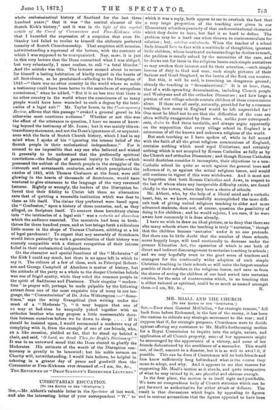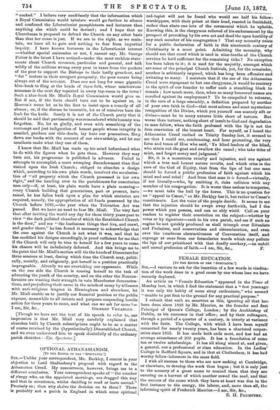MR. MIALL AND THE CHURCH.
[TO TR6 EDITOR OF TAR "SPECTATOR.')
Slit,—Ever since General McClellan, "for strategic reasons," fell back from before Richmond, in the face of the enemy, it has been the custom to ridicule any strategic movement to the rear ; and I suppose that if, for strategic purposes, Churchmen were to decide against offering any resistance to Mr. Miall's forthcoming motion for a Royal Commission to inquire into the origin, nature, and application of all Church property, some of her opponents might be encouraged by the appearance of a victory, and some of her friends disheartened by the semblance of a surrender. This would not, of itself, amount to a disaster, but it is as well to avoi lit, if possible. This can be done if Churchmen will let both friends and foes know sufficiently long beforehand what is the course they mean to adopt, and why. And it appears to me that reasons for supporting Mr. Miall's motion as it stands, and quite irrespective of what he may intend by it, are plentiful and obvious enough.
In the first place, the motion is in itself right and-justifiable. We have no compendious body of Church statistics which can be put forward as authoritative for either attack or defence. The result is that discussions which begin by appealing to figures end in mutual accusations that the figures appealed to have been
"cooked." I believe very confidently that the information which a Royal Commission would tabulate would go further to silence and confound the Liberationist pamphleteers and lecturers than anything else which could be devised ; and I hope that no Churchman is prepared to defend the Church on any other basis than that her cause is just. If we are in the right, as we main- tain, we have all to gain and nothing to fear from impartial inquiry. I have known lecturers in the Liberationist interest —whether special emissaries or not, I cannot say, Mr. George Potter is the latest I have noticed—make the most reckless state- ments about Church revenues, particular and general, and talk wildly of the millions wrung every year in taxes from the pockets of the poor to support the Bishops in their lordly grandeur, and " fat " rectors in their arrogant pomposity, the poor curate being always out of the account. Does one not long for some gigantic blue-book to fling at the heads of these folk, whose mischievous nonsense is the next day repeated in every tap-room in the town ? Such a blue-book Mr. Miall's Royal Commission would give us. But if not, if the facts should turn out to be against us, in Heaven's name let us be the first to insist upon a remedy of all abuses ; or, if the disease be incurable, let us of ourselves bare the limb for the knife. Surely it is not of the Church party that it should be said that partisanship was remembered while honesty was forgotten. No, let us gladly, and even with something of the contempt and just indignation of honest people whose integrity is assailed, produce our title-deeds, lay bare our possessions, fin g down our books with the account of our stewardship, and let our assailants make what they can of them.
I know that Mr. Miall has made up his mind beforehand what to do with the figures when he gets them. However they may turn out, his programme is published in advance. Foiled in attempts to accomplish a more sweeping disendowment than that visited upon the Irish Church ; obliged to abandon a design which, according to his own plain words, involved the secularisa- tion of "all property which the Church possessed in her own right," and the handing over to the parishioners for unsectarian uses only—if, at least, his plain words have a plain meaning— every Church building that generations, past or present, have raised, he has fallen back upon a plan for which statistics are required, namely, the appropriation of all funds possessed by the Church before 1689,—the year when the Toleration Act was passed. But we have no need to fear Mr. Miall. The very fact that after inviting the world any day for these thirty years past to view "the dark polluted chamber of which the Established Church is the door," and see "the loathsome things that live, and crawl, and gender there," he has found it necessary to acknowledge that the case against the Church is not what it was, and that he has modified his designs accordingly, is proof sufficient for me that if the Church will only be true to herself for a few years to come his chance will be indefinitely deferred. And this brings me to the point that Mr. Miall's motion will tie the hands of Dissenters for three sessions at least, during which time the Church may, politi- cally, socially, and religiously, put herself in a position practically impregnable. Already we are overtaking our opponents. While on the one side the Church is rousing herself to the task of educating the youth of the country, and on the other the Noncon- formists are wasting their strength in vain Manchester demonstra- tions, and prejudicing their cause in the minds of many by alliances with anti-religious leagues in Birmingham and elsewhere, let Mr. Miall enable us to justify our financial position at the public expense, meanwhile to all intents and purposes suspending hostile action for three years to come, and what can we ask for more?....
[Though we have not the text of his speech to refer to, our impression is that Mr. Miall very carefully explained that churches built by Church subscriptions ought to be as a matter of course retained by the (hypothetically) Disestablished Church, and we even understood him to speak doubtfully of the ordinary parish churches.- -En. Spectator.]



































 Previous page
Previous page